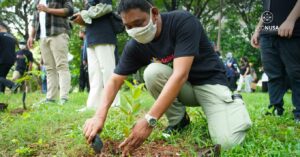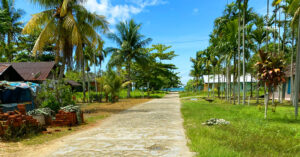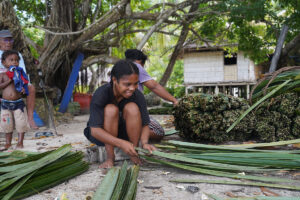
EcoNusa Foundation, Pandu Laut Nusantara Organization and Konservasi Laut Foundation (YKL) organized beach clean-up (BCU) activities in Tanjung Bayang coastal areas, Makassar, South Sulawesi on March 15, 2020. The beach clean-up collected more than 1.4 tons of debris particularly single use plastics.
The community, particularly youth communities, in Makassar enthusiastically hailed the initiative. The initiative involved 57 organizations and communities with around 1,300 young peoples that have environmental concerns. The action called peoples in Makassar City to not dispose their waste to the sea while reducing the single use plastics to conserve sea ecosystem.
Beach clean-up in Tanjung Bayang Beach was deemed the preliminary beach clean-up held by green organizations in 2020. Makassar was the option due to the fact that South Sulawesi is the province with 3.9 million tons of fish production in 2016. Besides, South Sulawesi is also dubbed the province with highest fish consumption in Indonesia with 46.5 kilogram per capita per year. Sulawesi is commonly reputable for the native of sailors and bravura fishermen with many splendid spots of sea tourisms.
Tanjung Bayang Beach is located nearby to the centre of Makassar and becomes one of the tourism destinations. The local community is under threats of single use plastics waste. The beach clean-up in fact could collect 1.436 tons of debris within about two hours stretching along 1 kilometre area which are dominated by Styrofoam and plastic debris.
Director of Konservasi Laut Foundation (YKL), Nirwan Dessibali, said that the existence of sea provides major contribution to the peoples in Makassar. Hence, as to Nirwan, it is necessary to keep the sea clean so that people could keep on getting the benefits from sea resources.
“Sea has given significant contribution to the life of peoples in Makassar and thus they should keep the sea clean and healthy to ensure their survival,” said Nirwan.
The debris consisted of 169.38 kilograms of hard plastics, 96.05 kilograms of soft plastics, 21.14 kilograms of metals, 16.9 kilograms of rubber, 312.53 kilograms of Styrofoam, 193.24 kilograms of glass, 16.73 kilograms of paper, 63.34 kilograms of wood, 47.52 kilograms of clothes, 4.27 kilograms of hazardous and toxic substances, 289.66 kilograms of organic and 205.36 kilograms of other debris.
Responding to the initiative, Chief of EcoNusa Foundation and Pandu Laut Nusantara, Bustar Maitar, said that the beach clean-up activities here are a momentum for all stakeholders to create a new tradition in the community.
“The beach clean-up activity here is a way for the government, organization and community that have concerns with the ocean to collaboratively give a living example to the community so that they could follow the beach clean-up activity. It is expected that it could change the community habit of using single-use plastics and disposing waste to the sea,” said Bustar.
Bustar expected that beach clean-up activity can be put as a routine agenda for Makassar City and replicated by many cities in Indonesia. And so, this initiative will help put the beauty, cleanliness and health back to the Indonesian ocean.
The collected and sorted out wastes were then transported partly to the waste bank in Makassar to get added values of the wastes. Some others were delivered to the final dumpsite in Makassar by the Environmental Office.
The participants of beach clean-up showed their spirits on Sunday. Their spirits bring new hope for a better ocean which is free from debris and healthy sea for Makassar and the future of the nations.
Editor: Leo Wahyudi







